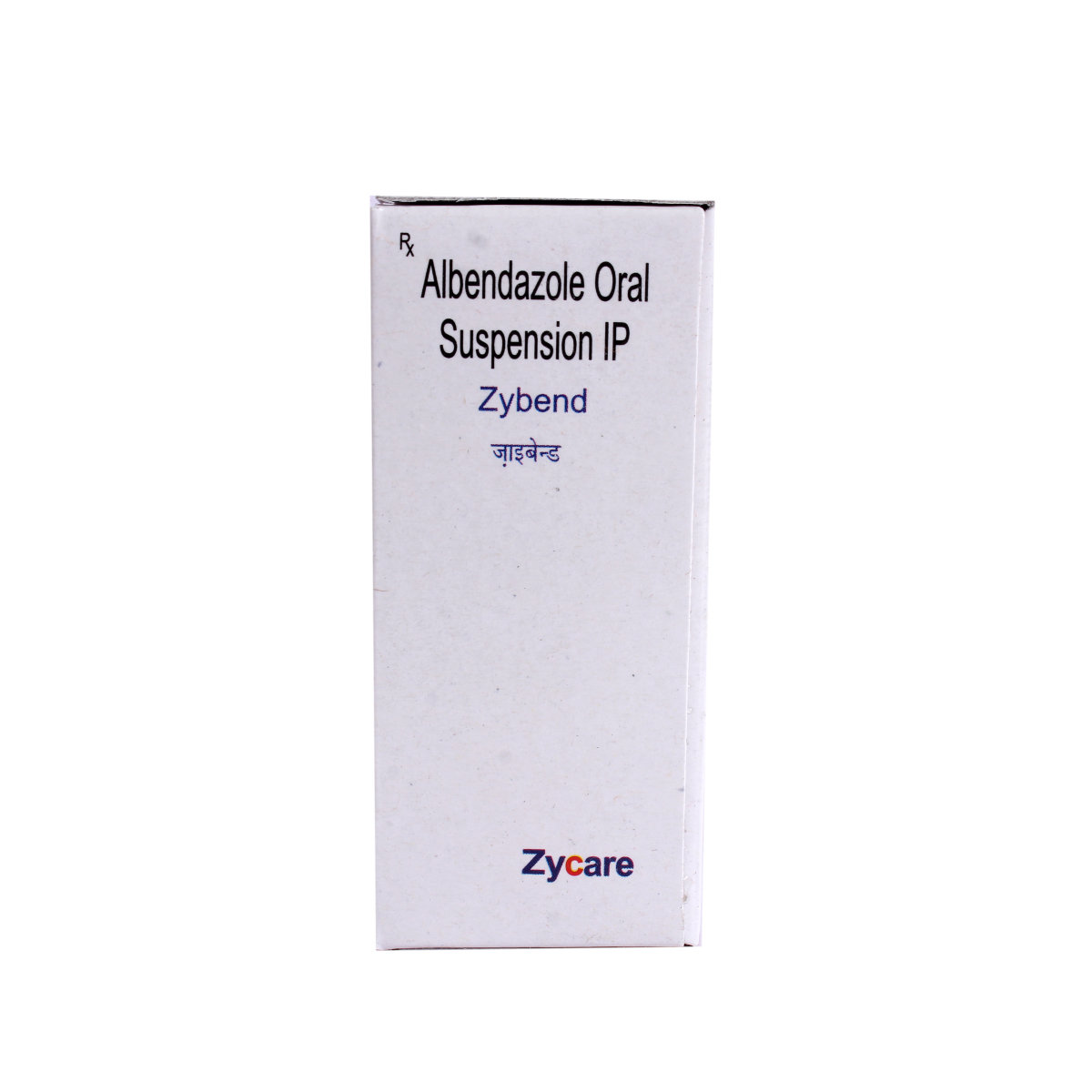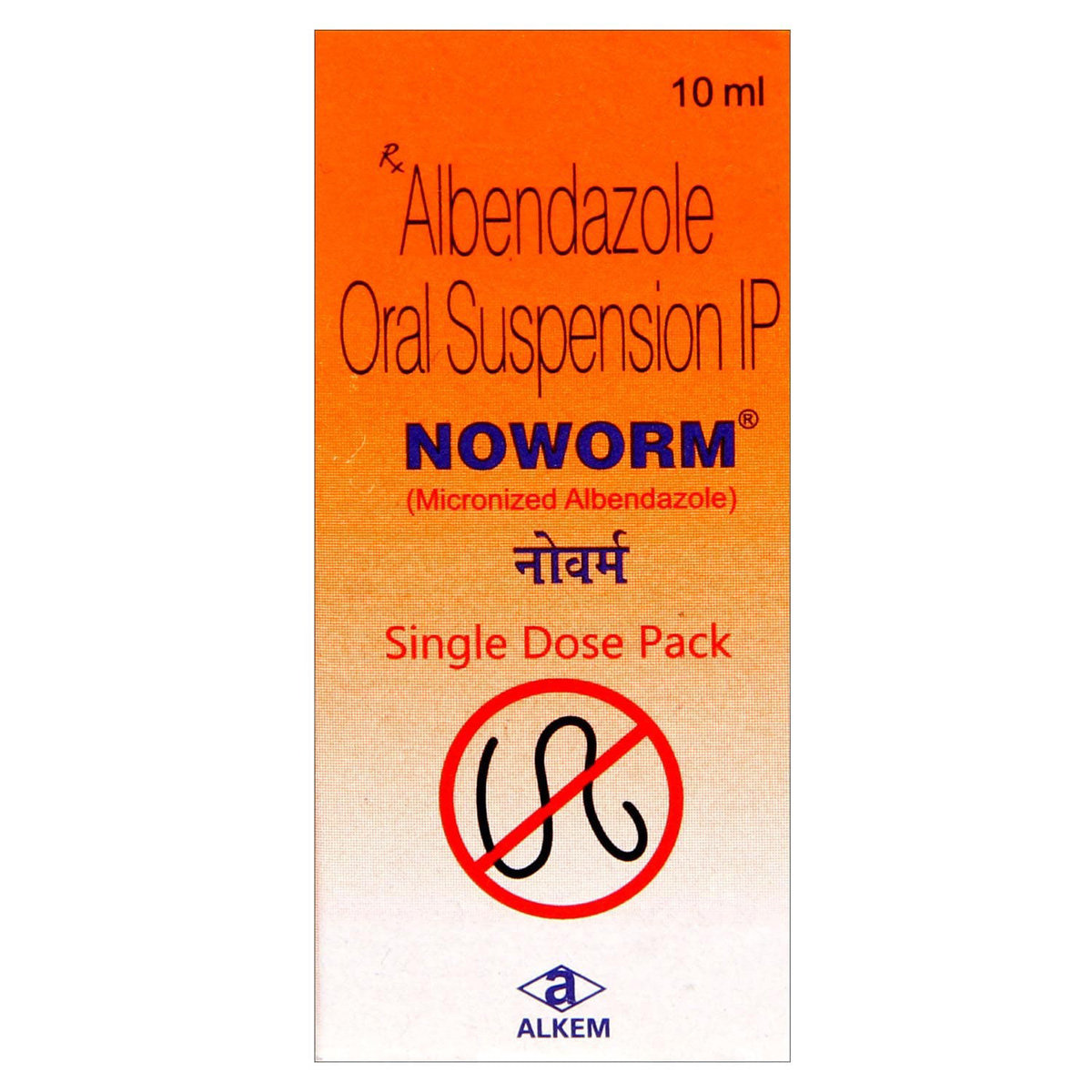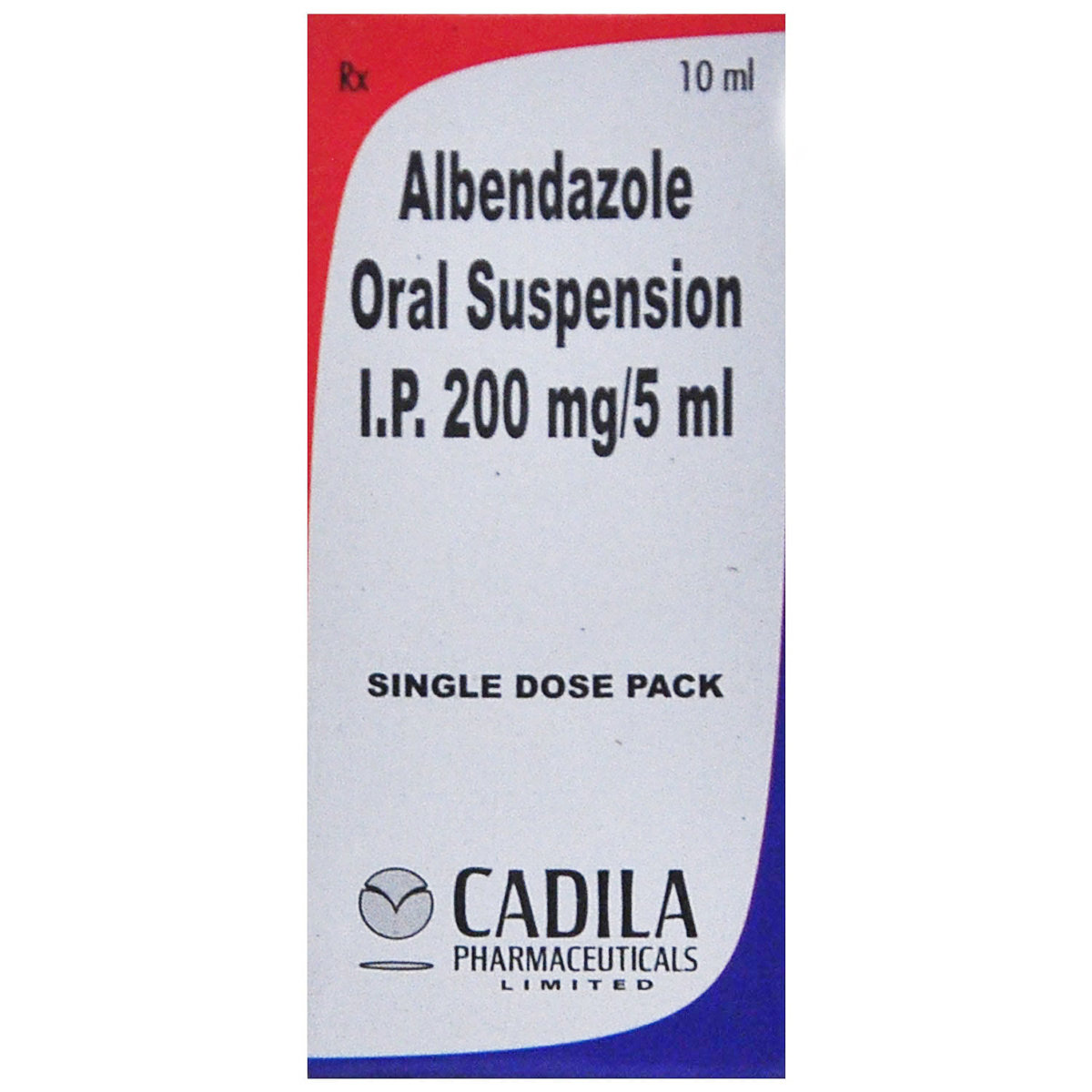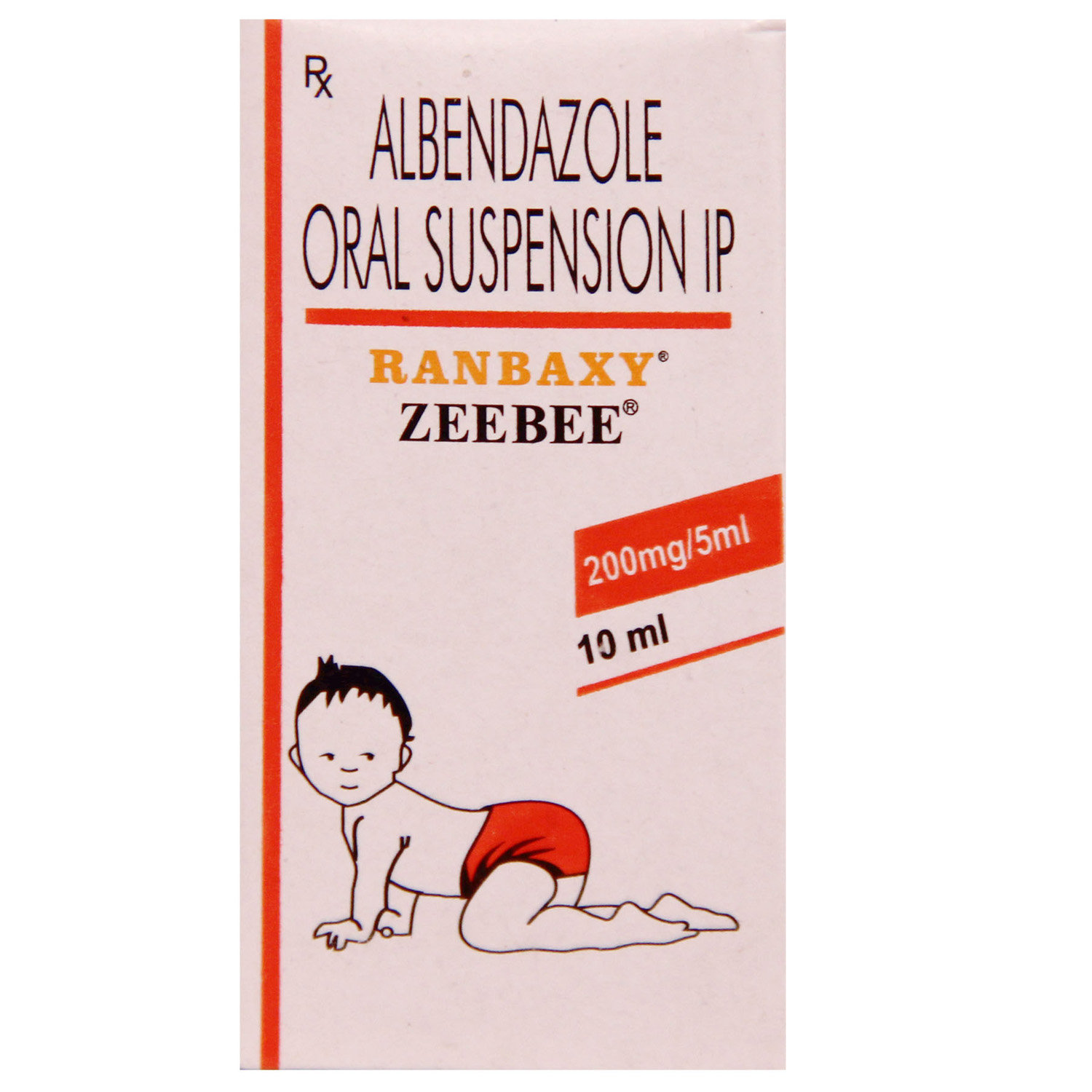Albid Suspension 10 ml
MRP ₹18.5
(Inclusive of all Taxes)
₹2.8 Cashback (15%)
Provide Delivery Location
Online payment accepted
 Prescription drug
Prescription drugWhats That
Composition :
Manufacturer/Marketer :
Consume Type :
Expires on or after :
Return Policy :
About Albid Suspension
Albid Suspension belongs to a group of antiparasitic drugs called 'anthelmintic' used to treat parasites worm infections like neurocysticercosis (infection caused by pork tapeworm) and cystic hydatid disease (infection caused by dog tapeworm). Additionally, Albid Suspension is also used to treat infections caused by roundworms, hookworms, threadworms, whipworms, pinworms, flukes, and other parasites.
Albid Suspension contains ‘Albendazole’, which works by inhibiting tubulin polymerisation. This causes metabolic disruption and energy depletion in the parasite, which leads to its immobilisation. Thereby, Albid Suspension kills the susceptible helminth and treats the infection.
Take Albid Suspension as prescribed. You are advised to take Albid Suspension for as long as your doctor has prescribed it for you, depending on your medical condition. You may experience certain common side effects, such as stomach pain, nausea, vomiting, headache, and dizziness in some cases. Most of these side effects do not require medical attention and will resolve gradually over time. However, you are advised to talk to your doctor if you experience these side effects persistently.
Albid Suspension might increase the chances of getting an infection; maintain proper hygiene, and try to stay away from people with infections, flu or colds. Consult your doctor if you notice unusual bleeding or bruising, as you may bleed or bruise easily while taking Albid Suspension. Do not take Albid Suspension if you are pregnant or planning for pregnancy as it may cause foetal harm. Do not breastfeed during and for a minimum of 5 days after treatment with Albid Suspension. Albid Suspension may cause dizziness, so be cautious while driving. Albid Suspension can be given to children if prescribed by the doctor. Keep your doctor informed about your health condition and medicines to rule out any side effects.
Uses of Albid Suspension
Directions for Use
Key Benefits
Albid Suspension belongs to a group of medicines called anthelmintic used to treat worm infections such as neurocysticercosis (infection caused by pork tapeworm) and cystic hydatid disease (infection caused by dog tapeworm). Albid Suspension is also used to treat infections caused by roundworms, hookworms, threadworms, whipworms, pinworms, flukes, and other parasites. Albid Suspension is a broad-spectrum anthelmintic drug which is highly effective against a wide range of intestinal helminths, including cestodes, nematodes, and trematodes. It is also effective against tissue helminth infections like cutaneous larva migrans (parasitic skin infections). Albid Suspension exhibits ovicidal, larvicidal and vermicidal activity. Albid Suspension inhibits tubulin polymerisation, which causes metabolic disruption and energy depletion in the parasite. This leads to the immobilisation of the parasite. Thereby, Albid Suspension kills the susceptible helminth and treats the infection.
Storage
- Consult a doctor for a proper diagnosis, as elevated liver enzymes or high protein levels may indicate liver disease or other health issues.
- Your doctor may adjust the medication dosage or switch to a different medication if the condition is caused by it.
- Limit or avoid alcohol to reduce stress on the liver.
- To promote liver health, eat a well-balanced diet rich in fruits and vegetables, whole grains, and lean proteins.
- Exercise regularly, like walking or jogging, to support liver health.
- Regular blood tests are necessary to check enzyme levels and progress.
- Hydrate your body: Drink enough water to prevent dehydration and headaches.
- Calm Your Mind: Deep breathing and meditation can help you relax and relieve stress.
- Rest and Recharge: Sleep for 7-8 hours to reduce headache triggers.
- Take rest: lie down in a quiet, dark environment.
- Cold or warm compresses can help reduce tension.
- Stay Upright: Maintain good posture to keep symptoms from getting worse.
- To treat headaches naturally, try acupuncture or massage therapy.
- Over-the-counter pain relievers include acetaminophen and ibuprofen.
- Prescription Assistance: Speak with your doctor about more substantial drug alternatives.
- Severe Headaches: Seek emergency medical assistance for sudden, severe headaches.
- Frequent Headaches: If you get reoccurring headaches, consult your doctor.
- Headaches with Symptoms: Seek medical attention if your headaches include fever, disorientation, or weakness.
- Inform your doctor immediately if you experience a fever after starting a new medication.
- Your doctor may adjust your medication regimen or dosage as needed to minimize fever symptoms.
- Monitor your body temperature to monitor fever progression.
- Drink plenty of fluids, such as water or electrolyte-rich beverages, to help your body regulate temperature.
- Get plenty of rest and engage in relaxation techniques, such as deep breathing or meditation, to help manage fever symptoms.
- Under the guidance of your doctor, consider taking medication, such as acetaminophen or ibuprofen, to help reduce fever.
- If your fever is extremely high (over 103°F), or if you experience severe symptoms such as confusion, seizures, or difficulty breathing, seek immediate medical attention.
- Boost your immunity by including immune rich foods in your diet and always remember to stay hydrated.
- Get sufficient sleep and manage stress which helps in improving white blood cell count.
- Consult your doctor for an effective treatment to improve the blood cell count and get regular body check up to monitor changes in the count.
- Try to prevent the factors that cause a decrease in white blood cells which may lead to impaired immunity.
Drug Warnings
Do not take Albid Suspension if you are allergic to any of its contents. Albid Suspension may cause bone marrow suppression, aplastic anaemia, and agranulocytosis. Inform your doctor if you have/had liver disease; if you have any surgery, including dental surgery. Consult your doctor immediately if you experience seizures, vomiting, headache, extreme tiredness, or behaviour changes while taking Albid Suspension. Regular blood cell count and liver function monitoring is advised during treatment with Albid Suspension. Albid Suspension might increase the chances of getting an infection; maintain proper hygiene, and try to stay away from people with infections, flu or cold. Consult your doctor if you notice unusual bleeding or bruising, as you may bleed or bruise easily while taking Albid Suspension. Do not take Albid Suspension if you are pregnant or planning for pregnancy as it may cause foetal harm. Do not breastfeed during and for minimum of 5 days after treatment with Albid Suspension. Albid Suspension may cause dizziness, so be cautious while driving. Albid Suspension can be given to children if prescribed by the doctor.
Drug-Drug Interactions
Drug-Drug Interactions
Login/Sign Up
Taking Albid Suspension 10 ml with Cladribine can increase the risk of side effects.
How to manage the interaction:
Although taking Cladribine and Albid Suspension 10 ml together can evidently cause an interaction, it can be taken if a doctor has suggested it. If you have any of these symptoms, contact a doctor right away. These symptoms include fever, chills, diarrhea, sore throat, muscle aches, difficulty breathing, weight loss, and pain or burning when you urinate. Do not stop using any medications without talking to a doctor.
Co-administration of Albid Suspension 10 ml with Clozapine may increase the risk of infection.
How to manage the interaction:
Although there is a possible interaction between Albid Suspension 10 ml and Clozapine, you can take these medicines together if advised by your doctor. However, if you develop symptoms such as chills, diarrhea, fever, sore throat, shortness of breath, muscle pains, blood in phlegm, weight loss, red or inflamed skin, body sores, and pain or burning during urination, contact a doctor immediately. Do not discontinue the medication without consulting a doctor.
Drug-Food Interactions
Drug-Food Interactions
Login/Sign Up
Grapefruit Juice, Grapefruit
How to manage the interaction:
Consuming Grapefruit and Grapefruit juice can increase the absorption of Albid Suspension 10 ml. Avoid consuming Grapefruit and Grapefruit juice while being treated with Albid Suspension 10 ml.
Diet & Lifestyle Advise
- Regularly wash your hands with soap and water, especially after using the toilet and while eating.
- Avoid eating raw fish and meat.
- Thoroughly cook meat before eating.
- Wash all fruits and vegetables properly before consuming.
- Wash or reheat food that has been around for a long time.
- Avoid contact with soil that may be contaminated with faeces.
- Avoid foods that have been kept open in the markets as they can be contaminated.
- Drink boiled and purified water.
Side Effects of Albid Suspension
- Stomach pain
- Nausea
- Vomiting
- Headache
- Dizziness
Habit Forming
Therapeutic Class
All Substitutes & Brand Comparisons
RX
Out of StockAnglozole 200mg Suspension
Anglo French Drugs & Industries Ltd
₹7.26
(₹0.65/ 1ml)
61% CHEAPERRX
Out of StockAlbrodo 200mg Suspension
A. Menarini India Pvt Ltd
₹11.97
(₹1.08/ 1ml)
35% CHEAPERRX
Out of StockAlbstat Suspension
₹14.1
(₹1.27/ 1ml)
23% CHEAPER
Author Details
We provide you with authentic, trustworthy and relevant information
Drug-Diseases Interactions
Drug-Diseases Interactions
Login/Sign Up
Albid Suspension 10 ml should be administered cautiously in patients with compromised hepatic function.
How to manage the interaction:
Albid Suspension 10 ml should be used with caution in patients with compromised liver function. Clinical monitoring of liver function is recommended before starting Albid Suspension 10 ml and at least every two weeks during therapy.
Albid Suspension 10 ml for neurocysticercosis should be administered cautiously in patients with or predisposition to seizures.
How to manage the interaction:
Albid Suspension 10 ml should be used with caution in patients with or prone to fits.
The pharmacokinetics of Albid Suspension 10 ml in patients with impaired renal function have not been studied. Caution is advised if used in these patients.
How to manage the interaction:
Albid Suspension 10 ml should be used with caution in patients with impaired kidney function.
FAQs
Drug-Drug Interactions Checker List
- DEXAMETHASONE
- CIMETIDINE
- THEOPHYLLINE
- PRAZIQUANTEL
Special Advise
- Regular monitoring of blood cell count and liver function is advised during treatment with Albid Suspension.
- Albid Suspension might increase the chances of getting an infection; maintain proper hygiene, and try to stay away from people with infections, flu or cold.
- Consult your doctor if you notice unusual bleeding or bruising as you may bleed or bruise easily while taking Albid Suspension.
- Albid Suspension will not treat a viral infection such as the flu or a common cold.
Disease/Condition Glossary
Parasitic worm infections: Parasitic worms are also called intestinal worms or helminths. They live in and feed on the hosts leading to weakness and diseases. Common types of intestinal worms are roundworms and flatworms, such as tapeworms and flukes. Worm infections could occur due to consumption of contaminated water, food or soil, contact with contaminated faeces, poor sanitisation and poor hygiene. Symptoms of worm infections include abdominal pain, diarrhoea, nausea, vomiting, gas, bloating, fatigue, unexplained weight loss, and dysentery (bloody stools).

Have a query?
Alcohol
Safe if prescribed
It is unknown whether alcohol interacts with Albid Suspension. Please consult your doctor.
Pregnancy
Consult your doctor
Albid Suspension belongs to pregnancy category C. Do not take Albid Suspension if you are pregnant or planning for pregnancy as it may cause foetal harm. Please consult your doctor if you have any concerns regarding this.
Breast Feeding
Consult your doctor
Do not breastfeed during and for minimum 5 days after treatment with Albid Suspension. Please consult your doctor if you have any concerns regarding this.
Driving
Safe if prescribed
Albid Suspension may cause dizziness. Do not drive or operate machinery unless you are alert.
Liver
Consult your doctor
Dose adjustment may be needed in patients with liver impairment. Please consult your doctor if you have a liver impairment or any concerns regarding this.
Kidney
Consult your doctor
Dose adjustment may be needed in patients with kidney impairment. Please consult your doctor if you have kidney impairment or any concerns regarding this.
Children
Safe if prescribed
Albid Suspension can be given to children if prescribed by the doctor. Please consult your doctor. Your doctor will prescribe the dose of this medicine based on the age and body weight of your child.










_0.jpg?tr=q-85)

